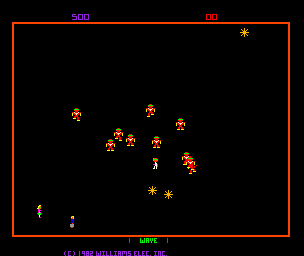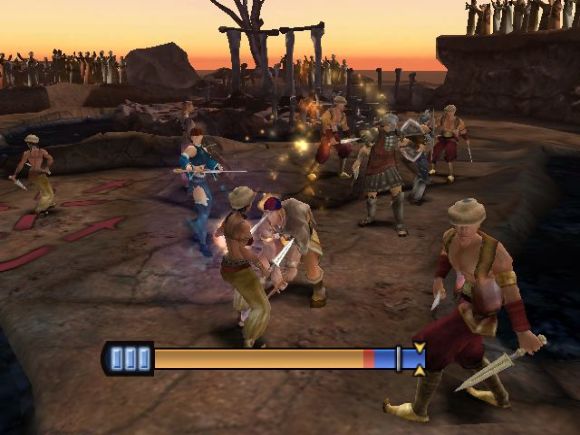March 20, 2004
 Metamechanics
Metamechanics
by peterbGame mechanics: the underlying rules and goals of a game. How do you decide what a player is allowed to do? When has a player won? How do player actions affect the game? The mechanics of a game are part of a game that is not narrative.
Some basic game mechanics:
- Run around in a circle; first one to finish wins. (all racing games)
- Kill everyone else and/or capture the flag (most FPSs)
- Move the ball to the scoring zone the most times (sports games)
- Capture and hold victory points (war games)
- Wager and win tokens (gambling games)
Compound games exist: Get the ball in the goal while killing everyone (Deathrow). Run around in a circle while killing everyone (Wipeout XL, Quantum Redshift). There are plenty more. What I've been thinking about today is not so much mechanics in the sense of the specific ways games play, as in these examples, but in what I think of as "meta-mechanics," the classes that the rules themselves fall into. For example...

Computer Ambush
A similar decision is whether there is a role for random chance in a game. A game such as chess, checkers, or go is a "pure" game; the outcome is determined entirely by where the pieces are placed. On the other side of the spectrum would be Candyland, where the player actually has no control whatsoever over his move, and just obeys the random chance of the card he pulled from the stack. Many in-between shades exist, from The Game of Life (where you get to make essentially one decision: "Go to college" or "Don't go to college") to Monopoly (where in the early part of the game you can decide whether to purchase or not purchase each property you randomly land on) to The Settlers of Catan where you make early wagers on probability and make non-random moves which will provide payouts later (or not) based on a die roll. There is a school of ludological snobbery that says that "pure" games that have no randomness -- such as chess, go, and checkers -- are inherently superior to games with a random element. The logic here seems to go something like: games are a competition, and if I can't prove my superiority every time by applying the power of my gigantic brain then the game sucks. I think that's clearly wrong -- randomness can have a place in games, just like in life. De gustibus non disputandum est.
It is an increasingly common trope in videogames to let the player substitute dexterity for randomness. For example, in Gladius, a well-designed tactical combat game, the player moves his pieces around an arena and chooses from a variety of attacks. There's an option to have the attack's success or failure be determined by a die roll (which would be the likely method of resolution if Gladius were a board game), but the default mode is io display a "skill bar." The game requires the player to press buttons on the controller in a certain pattern or with a certain rhythm. If the player completely muffs it, the piece she is controlling misses its opponent. If the player gets it right, the piece hits. If the player gets the rhythm just so, her piece performs a "critical hit" for extra damage. Many of the execrable Final Fantasy games use a variant on this system as well.
Robotron 2084
What other metamechanics can we identify? Why do some "strategy" gamers so vehemently prefer randomness to dexterity, when that randomness is only a part of the genre because doing more sophisticated modeling in a boardgame context is ponderous? Shouldn't the "roll a die" method of determining an outcome in RPGs and strategy games be outmoded, now that we have hyperintelligent transdimensional computers to do the hard modeling work for us? Is "roll a die" still the preferred method of combat resolution simply because it's easier for developers to implement, and we're all lazy?
Additional Resources
Score points by moving your piece into the target areas below and clicking.
- Eric observes that talking about these things can be hard.
- There are plenty of people that think about this stuff more carefully than I do.
- Everyone knows where to get videogames, but if you have no local board-gaming shop, you can get great board games from Funagain.
- It bothers me that Carabande (and its inferior remake) are so expensive.
Work through all the obstacles in order to reveal the developing story and get the hero(es) to win the day (Adventures, RPGs)
:)
It might be that players prefer randomness to dexterity because randomness treats everybody equal, in the long run. Dexterity is something that takes hard work to develop.
Many strategy gamers don't care about that - they want to concentrate on strategy.
And a purely deterministic outcome takes out an interesting element - risk. If I know my piece will die killing the other guy, I can carefully calculate if it's worth it. Boring. It's much more interesting if you *should* take the other guy out, but sometimes don't. Or if sometimes you are able to pull of a wonderfull suicide bomb run that completely turns the game.
Games without any randomness feel lifeless. Too much randomness, and they're annoying instead. Just the right amount of randomness, and you create the image of much more depth than the game has. (The last part (about depth) is I think something Richard Garriot said, but I can't find the quote right now)
Posted by Robert 'Groby' Blum at March 20, 2004 08:36 PMRobert,
Good point about how randomness can destabilize the balance of a game if it is skewed too far in either direction.
Now I want to play Sid Sackson's classic dice rolling game "Can't Stop".
Posted by peterb at March 21, 2004 08:39 AMBecause I was a chess and adventure game addict when I was young, I always felt randomness was a very cheap and undesirable mechanic. Then chess lost it's magic because I realized it is actually just a big game of tic-tac-toe. A very deep, highly sophisticated version, but still a mathematically finite game which, if played perfectly from both ends, would end in a draw every time. That killed the mystery for me :/ The one dimensional nature of adventure games also became limiting. They are engaging as a puzzle is engaging, but there is only one way through and the solutions are at the mercy of the game's writer and so can be unfairly silly or nonsensical.
I still don't really like too much randomness as I think it removes the skill and so the challenge from a game. Now, I think the best sort of "randomness" is that provided by other players, which is why online games are bigger experiences (generally) for me than single player games.
Artificial randomness always feels that way. Human randomness... now there's a new dynamic ;)
Posted by monty at March 21, 2004 08:56 AMI'm not sure if chess has been *proven* yet to be completely balanced. Many chess players *believe* black has a slightly weaker position.
As for the skill/randomness pair - I think it's a bad choice to offer dexterity as a skill, especially if it's the only skill that can make a significant difference. Maybe it's time for games to explore other skills except dexterity.
Posted by Robert 'Groby' Blum at March 21, 2004 02:48 PMBlack's position is definitely weaker, but it is very slight, and in all the reasonable variations in all the openings only ever gain a "theoretical" advantage for white by the middle game. People still play "losing" lines for Black, because they offer advantages if opponents don't play the perfect lines against them, which below Grandmaster level they rarely do. If you had two perfect players, it's more likely the game would be drawn than any other outcome.
However, even if it would result in a win for White every time (which I doubt because Black can dictate the defensive line, and aggresively lead it toward a draw by swapping off pieces etc.), it would still be an unavoidable outcome. That's what spoilt the game for me :/
Posted by monty at March 22, 2004 12:25 AMPlease help support Tea Leaves by visiting our sponsors.

